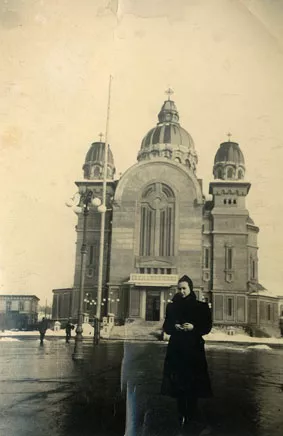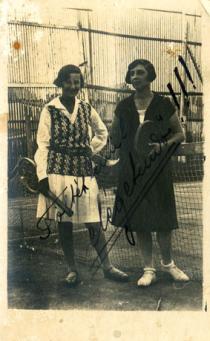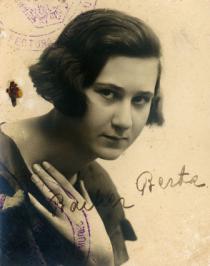I’m standing in front of the [Romanian] Orthodox cathedral. I had an inflamed middle ear, and the doctor told me to protect my ears from cold. Winter came, and I took a childhat, and put it on my head. After that a lot of women started to wear childhats, because they said: ‘Well, if Mrs. Almasi wears it, this must be the fashion for sure!’ I was laughing to myself, because I put this on to protect me. And this one too suited me well. I wear a fur-coat here too. This is a sealskin fur-coat. It is also an animal, it comes right after the Persian. There was a good furrier here, a Hungarian man called Arpad Csiszar; he went to Leipzig in every autumn to the fure exhibition, where furriers came from all around Europe. He bought there the furs. He didn’t work for example with sheepskin, only with furs. He made short fur-coats, long ones, furcaps. He worked well.
When I think back, my life was quite vivid before 1940. I was living as a young is supposed to live. I had a decent marriage, I was dancing, because I liked it, I went in for sports, because I enjoyed it. I was a housewife, I didn't like it, but I did what I had to. With a servant. There was a girl who cooked at my mother's house for three years, she was called Viki, Viktoria, and my mother sent her to me. She always used to say: 'You'll see, your husband will send you home, he will divorce you, because you're not able to cook a caraway-seeds soup.' Viki stayed at me for more than two years. However in summer I was at the market every morning at six. I liked to pick out the fresh ones, I always bought the best. Bottling, eating them… I took care to buy the cheaper ones, because I couldn't spend much. Mammy used to say: 'It should always be the best what you bottle. So that it keeps.' It [bottling] was fashionable then, we had a hundred of bottles. Oh, ten years ago I still had a hundred of bottles in my larder: compotes and jam. Now I have a freezer, I preserved green beans, aubergine, mushrooms, sorrel. Back then I preserved the same in bottles.
I had some lard in my house, because I liked bread with lard, but I took care not to mix it [with goose fat], because my parents ate at me and my parents-in-law ate at me - so I took a great care to this. They were kosher, but even my father wouldn't have eaten at me, if he knew. He arranged in a way to eat it [treyf meals] out, so that we didn't find out. He worked on Sundays, but we accepted that we had to have something to live of. We brought home many times a little piece of ham, but we had a tin plate, and we ate it half from the paper, half from that plate, in the kitchen, where we would never have eaten otherwise. My husband didn't know for a long time that I was eating bread with lard. I never picked up breadcrumbs before Passover, I never organized Pesach [separately]. At Pesach we always went to mammy, until my parents, more precisely my father was alive. After my father died, we had nobody to lead that ceremony. Here [in Marosvasarhely] was a Jewish Club in the main square, it organized Passover for 8 days, and we took lunch there for those 8 days. They laid the table up on the first floor, there was somebody who told the tale [Editor's note: That is he read out the Haggadah], as a symbol. The stealing of the afikoman was ignored, it can be hid only within the family.
The boys had an organization, the girls didn't. I wasn't member of the WIZO when I was a girl, only as a married woman. We gathered so that we organized game of cards in the after-noon. It seems we didn't like to chat a lot. We chattered half an hour, that was it, it was enough. Playing cards seemed to engage our interest more, and it attracted people. I was a great card-player before the war already. Of course not with millions, but according to my pocket. There were WIZO evenings, the gains went for the WIZO, so I gave to the WIZO what I gained. Whoever had a proper apartment and money, organized such parties four times in one year. I had five rooms, and my dining-room was large, so I could organize it. If I opened the hall, the dining-room and the hall were so big together as a chamber. I organized about four parties, and my girlfriend organized as well. It meant that four times four, sixteen people [were invited]. I provided them with teacakes, coffee - I don't' know whether it was coffee or tea -, so with something modest, not gateau and things like that, just something to serve the purpose, so that sixteen persons would gather. The gain after sixteen persons went for the WIZO.
There was a Jewish Club here, some people went out there. There was a separate Hungarian Casino as well. Jewish Club and Hungarian Casino - these were their official names. I think it [the casino] too had Jewish members. As far as I know Reti and his friends/family frequented the Hungarian Casino. But whoever frequented the Hungarian Casino, wasn't member of the Jewish Club. One could play cards in the Club, there was a lecture room with periodicals and music. It had a separate small room, a small kosher restaurant, so one could have there for dinner something simple. The small restaurant didn't have a name. However the main emphasis was on cards. Men, my husband too played 'Chemin de fer' - this is a French expression -, it's like the roulette, but it isn't roulette, it's also a game of chance. Then there was the poker, it was the main game. There were private rooms, small ones, people played there for high stakes. Well, who had money. We never went there. My husband played poker as well, but only within our purse. I played rummy three times in a week. We had fixed days when to go to the club. On Tuesday, on Thursday and on Saturday evening. From early spring to late autumn they used to tell me: 'You're not serious, we don't like you…' - since I rather went in for sports in that period, so I didn't go regularly. On Saturday evening yes. But on Tuesday for example, at eight o'clock it was still daylight, and I was still playing tennis. However they didn't let me out from the games, they got me back. When autumn arrived, I got back my place. This was a middle-class lifestyle. We were together in the hall, but men set apart, and there was more than one room. Simple room with the adequate square tables, suitable for a rummy game. There were five or six tables with four chairs each. You couldn't sit there in fauteuils just like that. If you wanted to sit down, there was other large room, there were fauteuils, reading matter, periodicals. In some cases the wife liked to play cards, the husband didn't. He didn't stay at home, he had fun too, he went there, found a partner who wasn't alone as well, and he drank for example a beer in the summer. There were several such men. All women played. If it was the wife who didn't play, she stayed at home. A woman wouldn't have stayed there to watch his husband playing rummy or cards until one o'clock.
































